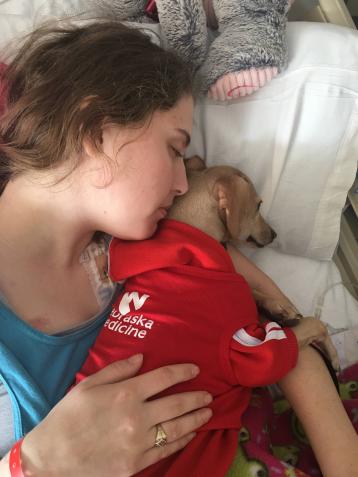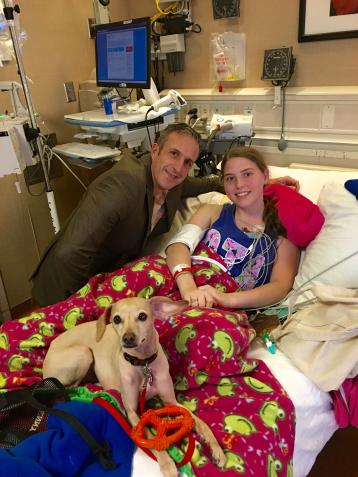Growing up in Kansas City, Mo., Tricia Melland was a competitive figure skater, gymnast, basketball player, diver and piano player. But something was always missing.
“I begged my parents for a dog,” says the 18-year-old. “But my mom told us we had too much going on and not enough time for one.”
In her mother’s defense, the family did have a lot going on. At the age of seven, Tricia’s life drastically changed.
“I started having what doctors referred to as a ‘medical mystery,’” she explains. “I was life-flighted to top medical facilities around the country. A flu bug or virus would wipe me out for months.”

It took doctors several years to diagnose Tricia with mitochondrial disorder, a life-threatening chronic illness that stems from rare genetic mutations. It causes muscle weakness, increased risk of infection, gastrointestinal issues, low blood sugar, organ failure and more. There is currently no cure.
“Right now, I am in intestinal failure,” explains Tricia. “My liver is still good, but I am TPN dependent, which means my fluid and nutrition are delivered intravenously through a central line that goes into my heart. I haven’t been able to eat real food in years.”
Tricia has spent months at a time in the hospital – including Nebraska Medicine, where she is a patient with the Intestinal Rehabilitation Program (IRP). During her stays, one activity always brings a big smile to her face.
“Pet therapy is the highlight of my day.”
In Oct. 2013, Tricia finally got her childhood wish. The Melland family stopped by a local rescue shelter and fell in love with Kenny – an 8 week old dachshund-Italian greyhound mix. Initially, they trained Kenny to be a therapy dog to take into local hospitals to visit with patients. But after having him for a few months, he started alerting Tricia to when her blood sugar was low.
“He’s able to notice certain things,” explains Tricia. “One time, I was passed out with a 104 fever and was septic. Kenny went running for help. He knows how to unzip my backpack and grab my blood sugar kit and medication bag if needed.”

As a dually trained pet therapy and service dog, Kenny has two different roles. When his vest is on, it’s all work and no play. In addition to alerting her to medical conditions, Kenny’s there to open and close doors, pick up dropped items and even untie Tricia’s shoes. But when the vest is off, Kenny’s playful side shines and he’s eager to do tricks, play catch or give kisses.
“Kenny is the best,” says Brandi Gerhardt, transplant nurse coordinator at Nebraska Medicine. “The entire IRP team is always excited to see him. He’s such a happy dog.”
On Tuesday nights when Kenny’s in Omaha, he can be spotted in a Nebraska Medicine shirt and badge, providing comfort to pediatric patients during pet therapy. Kenny also volunteers at a hospital in Kansas City.
“When we first brought Kenny home, I had no idea he would have such an impact on so many people,” says Tricia’s mom, Wendy Melland. “He helps our family, the community and most importantly – Tricia. Kenny provides a level of comfort and happiness that no one else can. The two are inseparable.”
This past fall, Tricia enrolled as a freshman biochemistry major at the University of Nebraska-Lincoln.
“I’m studying to become a doctor – probably involving Pediatrics and the gastrointestinal (GI) system.”
With Kenny by her side, anything is possible.
“Doctors claim there’s no cure for what I have, but I like to believe that there’s no cure yet,” smiles Tricia. “I hope to be a part of finding that solution.”
To schedule an appointment with the Intestinal Rehabilitation Program, call 800.922.0000.